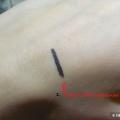How much weight increases during menstruation
Increased appetite, sometimes even gut attack in the middle of the night, constant thirst and uncontrollable mood swings - familiar symptoms? Then you are one of those who are familiar with premenstrual syndrome - PMS - personally. And although most girls do not feel it, the picture changes with age: according to statistics, more than 90% of women suffer from some form of PMS. It has a particularly negative effect on ladies who are prone to overweight. Changes in hormonal levels awaken a brutal appetite in them. 3-12 days before the onset of menstruation, the level of the hormone progesterone increases significantly in the body. He is responsible for pregnancy, and a woman expecting offspring must eat well in order to bear a child. This means that during this period the organism of the expectant mother must make supplies for the future.
Hence, such temporary troubles that appear before menstruation, such as swelling, constipation, bloating and weight gain. However, some ladies follow the lead of the body, letting go of the reins during PMS and, as a result, gradually overgrowing with fat. Ideally, before menstruation, the weight should increase by only 900 g, which will go away after menstruation. However, for most women, fluctuations occur in the range of 1-1.5 kg. Now think about it: a wolfish appetite made you eat 3 kg, after which you, at best, lost 2.7. (By the way, if the weight "walks" within wide limits, do not be surprised by the appearance of stretch marks and stretch marks.) This means that 300 g settled on the sides. This mechanism works every month, gradually accumulating excess fat. In order not to grow in breadth during PMS, it is worth following simple rules.
Why weight gain during menstruation
Control your weight
Get on the scale at least once a month - after a critical day, preferably on the same day on your menstrual calendar - and record the result. If the indicators do not change, then you know how to cope with your "menstrual" appetite.
Don't follow the mood
All women know about those dangerous days when an overwhelming desire to eat forbidden arises and many ask the question: "How much does the weight increase during menstruation?" Hang a sign in the kitchen with a simple truth: "PMS will pass, but the weight will remain." She will block your way to the refrigerator and will not allow you to throw everything in your mouth.
Pay attention to food
Avoid fatty foods - lard, pork, all kinds of sausages and high-fat cheeses. Forget that potatoes can be fried, and chicken has skin and that there is a universal sauce in the world - mayonnaise. Measure vegetable oil with a teaspoon, count nuts and seeds one by one. In addition, pickles, alcohol, beer and, of course, sweets (this concept includes confectionery, pastries, sugary sweet fruits, chocolate) should be as limited as possible. Have an educational conversation with your other half, as well as with yourself. Analyze your behavior during "critical" ailments. It is men who unconsciously help women gain excess weight during a difficult period. The stronger sex is afraid of the manifestations of premenstrual syndrome in loved ones like fire, especially tears, hysterics, quarrels. Trying in every possible way to alleviate the lady's suffering, to show care and understanding, they buy and prepare all those dishes that a woman does not allow herself on ordinary days. What's a disservice ?! Please note: as a rule, men spoil their loved ones with chocolate. Millions of tons of cocoa bean products are eaten by women around the world during PMS. Some ladies send their other half to the store for a chocolate treat, even at night. But all these tiles easily settle on the hips and waist!

Not an iron lady
It would seem that with the onset of menstruation, the dangerous period should end. But this is not happening. Every month, during critical days, a woman loses an average of half a glass (about 100 ml) of blood. Is it a lot or a little? Some ladies do not feel unwell at all during this period. But others clearly feel weakness, constant drowsiness, note a noticeable decrease in efficiency. Sometimes they experience a headache, attacks of dizziness and even fainting. After all, blood is not water! Red liquid, or rather its composition, affects the appearance and well-being of a woman. And during menstruation, the blood formula changes: the level of hemoglobin and platelets decreases, the level of leukocytes rises. If the diet is balanced, such changes disappear without a trace for women. But, unfortunately, according to statistics, almost 50% of the fairer sex have blood problems - especially among young girls who, for the sake of fashion and super-harmony, torture themselves with starvation and diets. The most common consequence of poor nutrition is anemia (anemia), which intensifies on critical days. Indeed, during menstruation, about 30 mg of iron is lost. Trying to compensate for the losses, to restore strength, women begin to eat heavily, giving preference to their favorite flour and sweet dishes, although the proportion of iron-containing foods should be increased in the diet.
Feed the blood
So how do women eat before and during critical days? Choose edibles that can "feed" the blood: lean meat (veal), beef, chicken, lamb liver, liver pate, all kinds of boiled shellfish - treat yourself to delicacies like mussels, oysters, snails. Of the fish, salmon is the richest in the required metal. In addition, iron is found in poultry meat, eggs (more in quail than in chicken), cocoa, sesame, nuts (pine, walnuts, almonds, peanuts, hazelnuts), dried fruits (dried apricots, raisins), dark chocolate, beans, peas , lentils, broccoli and plums. Wheat bran can be called the champion in iron content. To increase the level of hemoglobin, it is enough to add 1-2 tbsp to food. l. bran daily.
 How to have the perfect date when you're not romantic
How to have the perfect date when you're not romantic What diseases do you need to drink coffee - benefits and effects
What diseases do you need to drink coffee - benefits and effects All my brown eyeliners
All my brown eyeliners